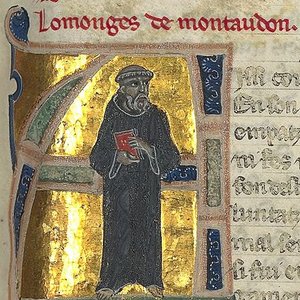Similar Artists
-
Guilhem Ademar
3 listeners
Guilhem Ademar (Old Occitan ; also spelled Guillem, Adamar, or Azemar; fl. 1190/1195–1217) was a troubadour from the Gévaudan in France. He… read moreGuilhem Ademar (Old Occitan ; also spelled Guillem, Adamar, or Azemar; fl. 1190/1195–1217) was a troubadour from the Gévaudan in France. He travelled between the courts of Albi, Toulouse, Narbonne, and Spain. He achieved fame enough duri… read moreGuilhem Ademar (Old Occitan ; also spelled Guillem, Adamar, or Azemar; fl. 1190/1195–1217) was a troubadour from the Gévaudan in France. He travelled between the courts of Albi, Toulouse, Narbonne, and Spain. He achieved fame enough during his life to be satirised by the nobleman and monk, Monge … read more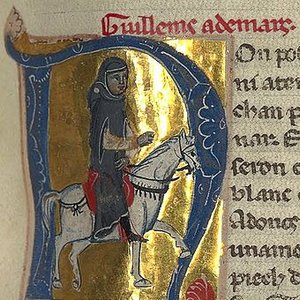
-
Arnaut de Mareuil
160 listeners
Arnaut de Mareuil (fl. late 12th century) was a troubadour, composing lyric poetry in the Occitan language. Twenty-five, perhaps twenty-nin… read moreArnaut de Mareuil (fl. late 12th century) was a troubadour, composing lyric poetry in the Occitan language. Twenty-five, perhaps twenty-nine, of his songs, all cansos, survive, six with music. According to Hermann Oelsner's contribu… read moreArnaut de Mareuil (fl. late 12th century) was a troubadour, composing lyric poetry in the Occitan language. Twenty-five, perhaps twenty-nine, of his songs, all cansos, survive, six with music. According to Hermann Oelsner's contribution to the 1911 Encyclopædia Britannica, Arnaut de Mareuil … read more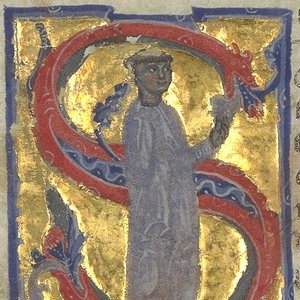
-
Peire d'Alvernhe
83 listeners
Peire d'Alvernhe or d'Alvernha (Pèire in modern Occitan; b. c. 1130) was an Auvergnat troubadour (active 1149–1170), twenty-one o… read morePeire d'Alvernhe or d'Alvernha (Pèire in modern Occitan; b. c. 1130) was an Auvergnat troubadour (active 1149–1170), twenty-one or twenty-four of whose works survive. His style was "esoteric" and "formally comple… read morePeire d'Alvernhe or d'Alvernha (Pèire in modern Occitan; b. c. 1130) was an Auvergnat troubadour (active 1149–1170), twenty-one or twenty-four of whose works survive. His style was "esoteric" and "formally complex" (i.e., trobar clus) and among the early troubadours … read more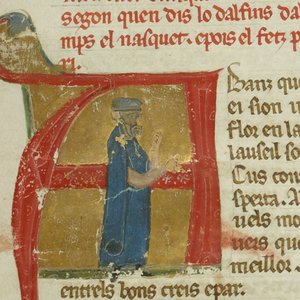
-
Folquet de Marseilla
41 listeners
Folquet de Marselha, alternatively Folquet de Marseille, Foulques de Toulouse, Fulk of Toulouse (c. 1150 – 25 December 1231) came from a Ge… read moreFolquet de Marselha, alternatively Folquet de Marseille, Foulques de Toulouse, Fulk of Toulouse (c. 1150 – 25 December 1231) came from a Genoese merchant family who lived in Marseille. He is known as a trobadour, and then as a fiercely a… read moreFolquet de Marselha, alternatively Folquet de Marseille, Foulques de Toulouse, Fulk of Toulouse (c. 1150 – 25 December 1231) came from a Genoese merchant family who lived in Marseille. He is known as a trobadour, and then as a fiercely anti-Cathar bishop of Toulouse. Initially famed as a troubado… read more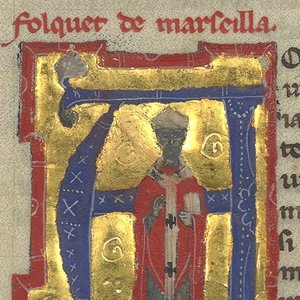
-
Folquet de Marseille
21 listeners
Folquet de Marselha, alternatively Folquet de Marseille, Foulques de Toulouse, Fulk of Toulouse (c. 1150 – 25 December 1231) came from a Ge… read moreFolquet de Marselha, alternatively Folquet de Marseille, Foulques de Toulouse, Fulk of Toulouse (c. 1150 – 25 December 1231) came from a Genoese merchant family who lived in Marseille. He is known as a trobadour, and then as a fiercely a… read moreFolquet de Marselha, alternatively Folquet de Marseille, Foulques de Toulouse, Fulk of Toulouse (c. 1150 – 25 December 1231) came from a Genoese merchant family who lived in Marseille. He is known as a trobadour, and then as a fiercely anti-Cathar bishop of Toulouse. Troubadour Initially famed as… read more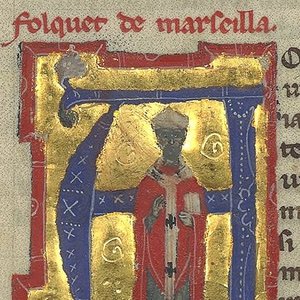
-
Pistoleta
28 listeners
Pistoleta (fl. 1185–1228) was a Provençal troubadour. His name (actually a nickname) means "little letter (epistle)" in Occitan. … read morePistoleta (fl. 1185–1228) was a Provençal troubadour. His name (actually a nickname) means "little letter (epistle)" in Occitan. He left behind eleven songs, comprising nine cansos and two tensos. Some of his pieces are assigne… read morePistoleta (fl. 1185–1228) was a Provençal troubadour. His name (actually a nickname) means "little letter (epistle)" in Occitan. He left behind eleven songs, comprising nine cansos and two tensos. Some of his pieces are assigned to an otherwise unknown Jordan de Born in the table of con… read more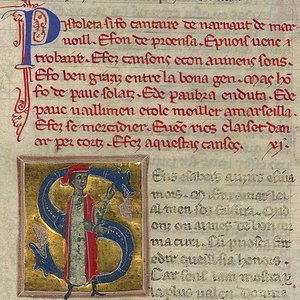
-
Pons de Capduelh
8 listeners
Pons de Capduelh (fl. 1160–1220 or 1190–1237) was a troubadour from the Auvergne, probably from Chapteuil. His songs were known for their g… read morePons de Capduelh (fl. 1160–1220 or 1190–1237) was a troubadour from the Auvergne, probably from Chapteuil. His songs were known for their great gaiety. He was a popular poet and 27 of his songs are preserved, some in as many as 15 manusc… read morePons de Capduelh (fl. 1160–1220 or 1190–1237) was a troubadour from the Auvergne, probably from Chapteuil. His songs were known for their great gaiety. He was a popular poet and 27 of his songs are preserved, some in as many as 15 manuscripts. Four of his cansos survive with musical notation. View wiki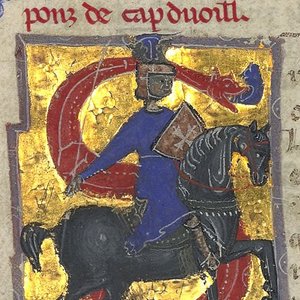
-
Guiraudo Lo Ros
4 listeners
Guiraudo lo Ros or Guiraudet le Roux (meaning "the redhead" or "the blonde") was a troubadour from Toulouse of a poor f… read moreGuiraudo lo Ros or Guiraudet le Roux (meaning "the redhead" or "the blonde") was a troubadour from Toulouse of a poor family of knightly rank. According to his vida he travelled to the court of his lord, called Count … read moreGuiraudo lo Ros or Guiraudet le Roux (meaning "the redhead" or "the blonde") was a troubadour from Toulouse of a poor family of knightly rank. According to his vida he travelled to the court of his lord, called Count Alfonso, probably a reference to either Alfonso Jordan or hi… read more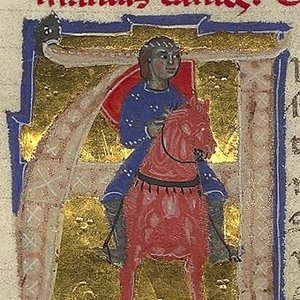
-
Perdigon
149 listeners
Perdigon or Perdigo (fl. 1190–1220) was a troubadour from Lespéron in the Gévaudan. Fourteen of his works survive, including three cansos w… read morePerdigon or Perdigo (fl. 1190–1220) was a troubadour from Lespéron in the Gévaudan. Fourteen of his works survive, including three cansos with melodies. He was respected and admired by contemporaries, judging by the widespread inclusion … read morePerdigon or Perdigo (fl. 1190–1220) was a troubadour from Lespéron in the Gévaudan. Fourteen of his works survive, including three cansos with melodies. He was respected and admired by contemporaries, judging by the widespread inclusion of his work in chansonniers and in citations by other trouba… read more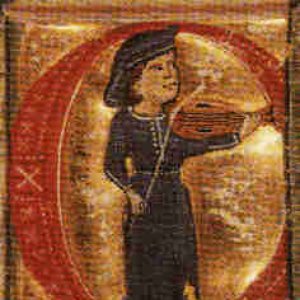
-
Monge de Montaudon
4 listeners
The (Lo) Monge de Montaudon (meaning "monk of Montaudon") (fl. 1193–1210), born Pèire de Vic, was a nobleman, monk, and troubadou… read moreThe (Lo) Monge de Montaudon (meaning "monk of Montaudon") (fl. 1193–1210), born Pèire de Vic, was a nobleman, monk, and troubadour from the Auvergne, born at the castle of Vic-sur-Cère near Aurillac, where he became a Benedicti… read moreThe (Lo) Monge de Montaudon (meaning "monk of Montaudon") (fl. 1193–1210), born Pèire de Vic, was a nobleman, monk, and troubadour from the Auvergne, born at the castle of Vic-sur-Cère near Aurillac, where he became a Benedictine monk around 1180. According to his vida, he composed &quo… read more